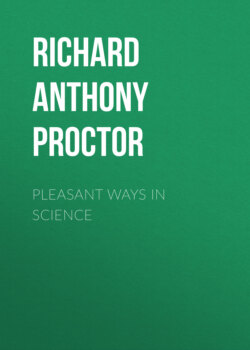Читать книгу Pleasant Ways in Science - Richard Anthony Proctor - Страница 3
PREFACE.
ОглавлениеIt is very necessary that all who desire to become really proficient in any department of science should follow the beaten track, toiling more or less painfully over the difficult parts of the high road which is their only trustworthy approach to the learning they desire to attain. But there are many who wish to learn about scientific discoveries without this special labour, for which some have, perhaps, little taste, while many have scant leisure. My purpose in the present work, as in my “Light Science for Leisure Hours,” the “Myths and Marvels of Astronomy,” the “Borderland of Science,” and “Science Byways,” has been to provide paths of easy access to the knowledge of some of the more interesting discoveries, researches, or inquiries of the science of the day. I wish it to be distinctly understood that my purpose is to interest rather than to instruct, in the strict sense of the word. But I may add that it seems to me even more necessary to be cautious, and accurate in such a work as the present than in advanced treatises. For in a scientific work the reasoning which accompanies the statements of fact affords the means of testing and sometimes of correcting such statements. In a work like the present, where explanation and description take the place of reasoning, there is no such check. For this reason I have been very careful in the accounts which I have given of the subjects here dealt with. I have been particularly careful not to present, as established truths, such views as are at present only matters of opinion.
The essays in the present volume are taken chiefly from the Contemporary Review, the Gentleman’s Magazine, the Cornhill Magazine, Belgravia, and Chambers’ Journal. The sixth, however, presents the substance (and official report) of a lecture which I delivered at the Royal Institution in May, 1870. It was then that I first publicly enunciated the views respecting the stellar universe which I afterwards more fully stated in my “Universe of Stars.” The same views have also been submitted to the Paris Academy of Science, as the results of his own investigations, by M. Flammarion, in words which read almost like translations of passages in the above-mentioned essay.
RICHARD A. PROCTOR.
